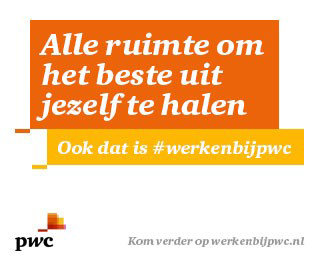For the Dutch version, click here
Consultant, financial analyst, auditor, and controller. This is a small selection of the career perspectives you could think of with the master accountancy and the master finance. However, one profession that is not often mentioned is teacher, while the graduates of both master’s programs can be trained within one year to become a teacher of Business Economics (formerly Management & Organisation) at secondary school.
Every year, enthusiastic students start this post-master program at Tilburg University, despite the poor image of the teaching profession. Remarks such as “You’re already on holiday?” or “A real man doesn’t become a teacher after all” do not help. What motivates future teachers to choose to teach, how do they experience the training program to become a teacher and what does it mean to be a teacher? You can read more about this in this article.
The choice
For this article, I spoke with Simone van Oosterhout, Frank Verstraten, and Wim Maas, all three choices for the educational post-master’s program to teach Business Economics at Tilburg University. Simone previously worked as an assistant accountant but chose to pursue her long-cherished wish of becoming a teacher. She is currently in the second semester of the program. Frank obtained his Master’s degree in Finance and worked in the business world for several years, but noticed that an office job did not make him happy. Therefore, he decided to switch to education, as this had previously suited him well as a tutor during his student days. Since 2019, Frank works at a secondary school as a business economics teacher. We know Wim as a university lecturer at Tilburg University. During his master Accountancy, he was looking for an alternative career for the often touted Big Four. By giving tutorials during his student years, he already knew that he liked teaching. Following this, he stumbled upon the teacher training program. After completing the course, he worked in a secondary school for one year before making the switch to university education.
The program
Students with a business economics background can make the transition to secondary school education through Tilburg University’s Teacher of Preparatory Higher Education in Management and Organisation program. A bachelor’s and master’s degree in business economics will automatically qualify you for this one-year post-master’s program. In the post-master’s program, students are trained to become first-degree qualified teachers of business economics at secondary schools. First-degree teaching qualification in Dutch education means that you are legally qualified to teach senior classes at HAVO and VWO level. In addition, with the first-degree diploma for business economics, you may also teach economic subjects in the second-degree domain, which includes practical education, vmbo, mbo, and the junior classes of havo and vwo.
“You are in front of the class from the very first week. You find out right away if it’s something for you.
The program is entirely in Dutch and consists of both subjects and an internship [1]. It trains you to be a so-called “starter competent teacher”. Simone explains what this means: “You shouldn’t have the illusion that you will be a perfect teacher after the program, but it does prepare you to stand independently in front of the classroom.” In total, you spend 15 ECTS on didactic subjects, 12 ECTS on didactic research and 33 ECTS as a trainee at a secondary school. The didactic subjects are divided into two parts. On the one hand, students are taught ‘Course Didactics’, which focuses on how to best explain business concepts to students and how to stimulate students’ understanding in addition to a theoretical explanation. In addition, students follow the course ‘General Didactics’, which is taught together with the other teacher training programs of Tilburg University. This course deals with general didactic topics, such as class management, motivation theories, and testing. Finally, in small groups, students research the field of teaching methods. After all, it is and remains a university education. Together, these subjects fill one to two days a week. The rest of the week you do an internship at a secondary school.
Teaching
Your internship at a secondary school starts simultaneously with the post-master and takes place three to four days a week. The secondary school is assigned to you in consultation with the training coordinator. Once at school, you are soon in front of the class, Simone, Frank, and Wim tell us. Frank experienced his internship as very instructive: “You have to work for hours and accept that you are going to make many mistakes. Eventually, these mistakes are what you learn the most from”. Wim also agrees with the usefulness of the internship: “You are in front of the class from the very first week. You find out right away if it’s something for you.
Fortunately, this proved to be the case for Simone, Frank, and Wim. All three concluded that they enjoyed teaching very much during their internship. They emphasize that it is the connection and dynamics with the students that make teaching fun. Frank explains that within the structure of the lesson and with a good atmosphere, there is room to fool around with the students. On the other hand, Wim also found it fun to delve more deeply into the content with his students. To dive into the content, Simone says, it can be useful to have worked in the business world for a couple of years before taking the teacher training course. She feels that her work experience enables her to explain certain concepts to her students better because she has seen them in practice.
While Wim has made a transition to higher education, Frank and Simone see themselves continuing to work at a secondary school in the future. Besides teaching the subject of Business Economics, Simone hopes to become a mentor of a class in the future. Frank has already made this happen and is currently a mentor of 4 vwo. Furthermore, he arranges everything concerning the profile assignments of students and organizes a study trip to Rome. Since all these tasks come on top of his teaching hours, I started to wonder about the pressure of work in education.
Work pressure
According to the Collective Labour Agreement (CLA) for Secondary Education [2], a full-time job in education consists of around 750 teaching hours on an annual basis, which comes down to twenty hours per week of teaching. This already indicates that a teacher does more than just stand in front of the class, such as class preparations, (student) meetings, and other administrative matters. Both Frank and Wim say that as a first-year teacher, you spend many hours preparing lessons because you cannot yet build on the preparations of previous years. In order to accommodate starting teachers, the CAO stipulates that first- and second-year teachers are entitled to a 20% and 10% reduction in teaching hours respectively. Compared to his previous job in mergers and acquisitions, Frank describes the workload as “different”. Whereas in an office job you can often give your own interpretation of the working day, in education you are expected to perform for the students for seven hours in a row. Nevertheless, Frank experiences less work pressure in education, partly because he derives energy from teaching.
The job opportunity
The chance that students in the teaching program will be offered a full-time job at their internship school is small. You are lucky if such a position becomes available at your internship place. Nevertheless, there is enough job opportunity for lecturers of Business Economics. Frank emphasizes that the well-known teacher shortage in education also applies to the subjects Economics and Business Economics in secondary schools.
Moreover, the job opportunities for first-grade qualified teachers do not stop at secondary education, as Wim’s career illustrates. He teaches courses within the Accountancy department of Tilburg University and supervises bachelor and master students with their theses. What is the biggest difference between teaching at a secondary school? “Everyone who attends class really wants to learn something”, Wim says. Even though class management is less important, Wim still uses his knowledge and experience of class management. Also with students, it is useful to know how to react as a teacher, when to use humor, and what to do when you don’t know the answer to a question, for example. Wim sees teaching as a profession in itself.
Your future
We complete the list of career perspectives for master students: consultant, financial analyst, auditor, and lecturer. Now that you know more about a career as a lecturer, the question is whether it is something for you. If you have any doubts, Frank and Wim recommend you accompany a lecturer for a while. Who knows, this first-hand experience might convince you of the teaching profession.

















